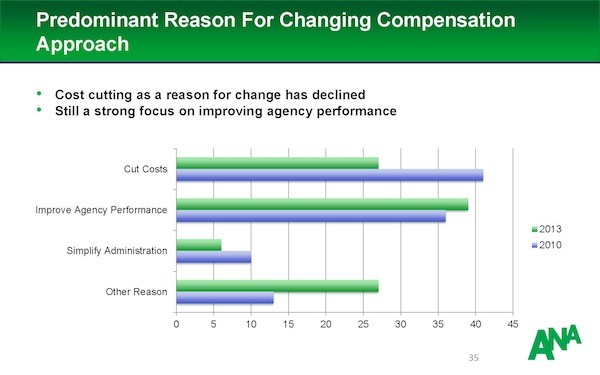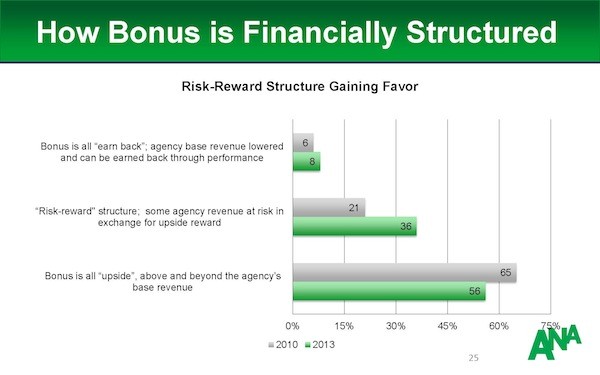This post is by Darren Woolley, Founder of TrinityP3. With his background as analytical scientist and creative problem solver, Darren brings unique insights and learnings to the marketing process. He is considered a global thought leader on agency remuneration, search and selection and relationship optimisation.
At the ANA Advertising Financial Management Conference this year in Phoenix, Arizona, Dave Beals presented the latest findings from the ANA Agency Compensation Survey.
There are some really interesting findings here, especially in regards to the development of incentive models and performance-based bonuses.
Thanks to the ANA I can share these with you.
WHY CHANGE COMPENSATION
Interestingly, there has been a shift in the motivations for changing agency compensation. In 2010 ‘Cutting Cost’ was the leading reason, which has been surpassed by ‘Improving Agency Performance’. Clearly marketers are discovering that you do always end up getting what you pay for. But then again, other reasons has doubled in the same time too.
This is supported by the trend in the ‘Use of performance incentives’, which while growing steadily since 1991, showed a significant 15 point jump between 2010 and 2013.
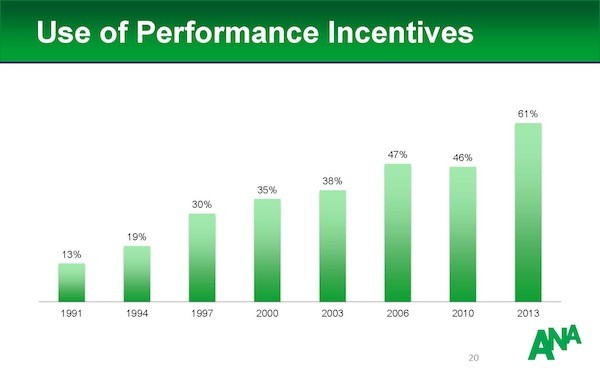 HOW THE AGENCY BONUS IS STRUCTURED
HOW THE AGENCY BONUS IS STRUCTURED
If increasing agency performance is the dominant reason for changing the compensation approach, then the way this performance bonus is paid is critical.
My experience says that a ‘big carrot and much smaller stick’ is the best approach. This is supported in the results. Although an ‘All upside’ bonus has dropped, it is still the approach for the majority. But the biggest increase has been in a ‘Risk Reward’ structure where the agency puts skin in the game with a significant upside reward.
It would be interesting to know what is the typical margin put at risk and what is the upside reward for the agency. And also if the marketer and agency are planning to increase these over time.
The ‘Risk Reward’ model is very effective when you get the mix of risk and reward balanced with the performance metrics that drive results.
There is a lot of talk about ‘Soft’, ‘Medium’ and ‘Hard’ metrics. The Soft metrics are the agency performance scorecards or relationship surveys. My belief is that this is the entry point into the bonus pool and that incentivising or paying a bonus for the agency to do their job well is a flawed investment. Medium metrics are marketing and communications metrics like brand perception and brand awareness. And Hard metrics are sales, profit and market share goals.
The agency performance reviews continues to be the highest, but sales and market share goals have increased significantly as more advertisers are aligning the agencies to their financial success. But there is a drop in profit goals as profit is one further step away from the metrics agencies can more directly influence. Drops are seen in most of the medium metrics.
If you want to directly impact agency performance, then having metrics directly related to that performance makes sense. The question is “Does that agency performance improvement justify the payment of the bonus in terms of the ROI on the marketers’ compensation investment?” Or ultimately, is the agency performance marketers want to encourage the agencies’ contribution to the financial performance of the brand or company?
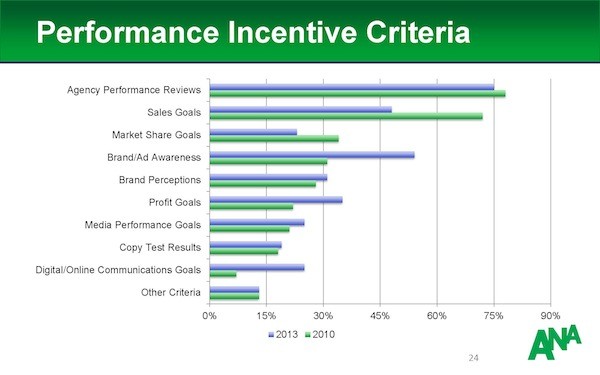 AGENCY PERFORMANCE BONUS EFFICACY
AGENCY PERFORMANCE BONUS EFFICACY
Around 60% of marketers report that they find incentives have seen improvement in agency performance and there has been a fall over time of those who believed there was no change in agency performance. This is all looking good for performance incentives.
But then in the most recent survey, there is a small, but significant uptick in those who believe the incentive has delivered a poorer agency performance.
Perhaps this is simply those marketers who have not got their agency performance metrics right. After all, what you measure is what you get.
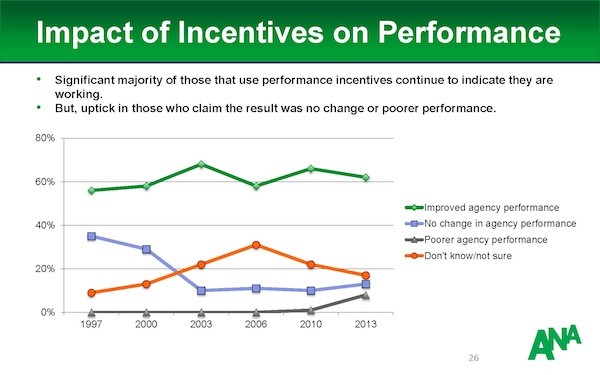 IMPROVING AGENCY PERFORMANCE COMPENSATION
IMPROVING AGENCY PERFORMANCE COMPENSATION
It is clear that correctly formulated, an incentive based compensation can improve agency performance. The best way of doing this is to think of the bonus as an incentive and to minimise the penalty to the agency but offer a significant upside.
What is critical is defining the right metric to measure the agency against. We have found that aligning all of the strategic agencies to the same criteria creates alignment. The entry point to the bonus scheme is delivering to or above expectation in the agency relationship or service performance. But the best core metrics are those shared with the marketing team, which are usually those related to financial performance or those metrics which correlate to those financial metrics.
It can be tricky to strike the right balance in risk and reward for the agency while creating the incentive to deliver the results.
In developing your own performance-based compensation, what have you found to be the critical success criteria? Let me know by leaving your comments and suggestions here.
